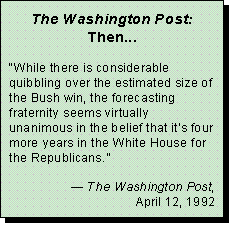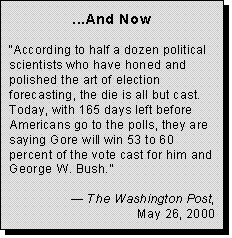 |
||||||||||||||||||||||||
|
||||||||||||||||||||||||
 |
||||||
|
||||||
 |
||||||||||||||||||
|
||||||||||||||||||
 |
|||||||||
|
 |
||||||||||||||||||||||||
|
||||||||||||||||||||||||
 |
||||||||||||||||||||||||
|
||||||||||||||||||||||||
|
What The Media Tell
Americans About Free Enterprise 
Predicting Presidential Winners: Is It the Economy, or Is It the Media? Twenty years ago on election night, the television networks stepped into a brief, mini-scandal by declaring Ronald Reagan the winner of the 1980 election a couple of hours before the polls had closed on the West Coast. The call, though accurate, was premature and therefore unseemly, said critics (many of whom were California Democrats). This year the networks are off the hook. One newspaper has beaten them all by making its election night call more than five months before the first votes are even cast.
The theory is that the economic health of the nation overrides most of the short-term static of a campaign; in a boom such as we’re enjoying now, the candidate of the incumbent party -- Al Gore -- should be a sure winner. The story was unusually timed, appearing as dozens of national polls show a consistent, though not overwhelming, lead for George W. Bush. As the political newspaper of record, the Post probably knew that the notion of a preordained Gore victory would get a lot of media play if placed on its front page. Sure enough, the story seemingly popped up everywhere over the long Memorial Day weekend; variations of it appeared in the Orlando Sentinel, Cincinnati Enquirer, Dallas Morning News, Seattle Times, Slate magazine, and the Times of London. CNN’s Frank Sesno and Bill Schneider bantered about it on the May 26 edition of Inside Politics, while NBC’s Tim Russert brought it up on Sunday’s Meet the Press. If the candidate’s low polling numbers have brought down the troops’ morale at Gore’s HQ, the news seemed well-timed to boost spirits. The Associated Press reported that the Gore campaign was "giddily" and "gleefully" promoting the Post story.
In a nutshell, the Post reported that several political scientists have constructed models based on past election results. The key variables are the state of the economy, the incumbent President’s approval ratings, and voters’ views of each party’s ability to promote peace and prosperity. By plugging the current values of each variable into the modeler’s equation, one discovers the share of the two-party vote that the incumbent’s party should win. The better the economy, the better the political prospects for the team currently holding the White House. This isn’t really a bombshell; the health of the economy has traditionally been a key issue in presidential elections. Kaiser, though, trumpeted the news as if he had discovered some sort of amazing stock-picking system. "Although Bush’s pollster finds fault with these forecasts," he wrote, "these academic prognosticators have a startlingly good record predicting election results months in advance." "If these models are right -- and in fairness to their cautious authors, none seems ready to bet his pension on his prediction -- Gore’s biggest advantages are the popularity of the president and the continuing economic boom," Kaiser enthusiastically added. What Kaiser didn’t tell readers was that the economic models he’s now touting flopped eight years ago -- and one reason may have been biased coverage by the national media. Back in 1992, in an article prepared for the Washington Post’s Sunday Outlook section, reporter Richard Morin wrote about the same researchers and models that Kaiser featured. "While there is considerable quibbling over the estimated size of the Bush win, the forecasting fraternity seems virtually unanimous in the belief that it’s four more years in the White House for the Republicans," Morin wrote. Six months later, President George Bush led the GOP to its lowest share of the presidential popular vote since 1912. This is not to suggest that the economic models are unreliable, only that they are not infallible. After all, the modelers emphasize real-world economic data, but voters are apt to base their decisions as much on their perceptions of the economy as on its statistical health. Back in 1992, the news media -- particularly television news -- painted a consistently negative portrait of the national economy all year. A research project I directed that year at the Center for Media and Public Affairs (CMPA) found more than 90 percent of all comments broadcast on the evening news during the ten months preceding the election cast the state of the economy in negative terms. That "uninterrupted stream of negative press and commentary," as the Roper Center’s Everett Ladd termed it, affected public opinion; by Election Day, 77 percent of the public were telling pollsters that the economic situation was bleak. The problem was that things weren’t as bad as the networks were telling voters. The recession actually spanned from the summer of 1990 through the spring of 1991, but garnered relatively little coverage because the national media were following the crisis with Iraq. The networks didn’t give audiences heavy doses of economic news until November 1991 -- months after the recession had actually ended, but right at the start of the next political season. Once they seized upon the economic story, reporters failed to offer any semblance of balance. On World News Tonight January 13, 1992, for example, ABC’s Peter Jennings referred to New Hampshire as an "economic misery zone," while reporter Jim Wooten noted that in most years the first primary state doesn’t resemble the rest of America. "But," said Wooten, "this time around, it does: the economy is a wreck....for many people, the word ‘recession’ doesn’t begin to tell the story." The networks kept up the dismal drumbeat all year, while steadily increasing growth rates --which reached an annualized rate of nearly 4% by the third quarter -- were largely ignored. Ironically, the negative portrayals of the economy ceased immediately after Clinton’s election in November. According to the CMPA study, quotes about the nation’s economic health averaged more than 60 percent positive for the remainder of 1992, compared with more than 90 percent negative prior to the election. A few reporters expressed regret about the imbalanced economic coverage after the ‘92 election. "If you look at the statistics, the economy didn’t stink as badly as we allowed Clinton to say it did," said Dan Thomasson, then with the Scripps Howard News Service. "We didn’t hold Clinton accountable and we should have." So, what about this election? Will voters give Bill Clinton and Al Gore the credit for the booming economy? Perhaps not, especially if the media give equal time to free market economists such as Lawrence Kudlow and Stephen Moore. They jointly wrote an op-ed which appeared in the Washington Times on February 1, the same day that the economic expansion — then 107 months old -- officially became the longest in U.S. history. (Count backwards: this historic expansion started long before President Bush left office). In their column, Kudlow and Moore made the case that Reaganomics has shaped today’s economy much more than Clinton’s policies. "While the chattering heads in Washington are claiming that this expansion is sweet vindication for Clintonomics, they are wrong. Dead wrong," they declared. "America’s economic turnaround started in the early 1980s, a decade before Bill Clinton arrived in Washington." "The lesson of the last 20 years, hopefully learned for all times, is that when American entrepreneurs and workers are liberated from heavy-handed and intrusive fiscal policies, punitive tax rates, and destabilizing monetary policies, the U.S. economy’s growth potential is almost limitless. If Washington officials can resist four prosperity killers -- high inflation, big tax hikes, re-regulation and trade protectionism -- then more decades of technology-led growth is clearly possible," argued Moore and Kudlow. If in Campaign 2000 the media present this free market message to voters in an unbiased fashion, that wouldn’t necessarily doom Gore’s chances. It would mean, however, that he might not win just on the basis of yesterday’s prosperity. Instead, Gore and Bush would each have to make the case that they would do the most to keep government on the sidelines and enhance the potential of the free economy for future growth. It might make things a bit less predictable come November, but isn’t that why we have elections?
Home | News Division
| Bozell Columns | CyberAlerts |
||||




 In
a May 26 front-page article, The Washington Post’s Robert
Kaiser declared that Al Gore has already sewn up victory, "by making
the clever decision to run in the midst of an economic boom, and by
choosing to succeed a popular incumbent." Kaiser wrote that six
political scientists "who have honed and polished the art of
election forecasting... are saying Gore will win 53 to 60 percent of
the [two-party] vote."
In
a May 26 front-page article, The Washington Post’s Robert
Kaiser declared that Al Gore has already sewn up victory, "by making
the clever decision to run in the midst of an economic boom, and by
choosing to succeed a popular incumbent." Kaiser wrote that six
political scientists "who have honed and polished the art of
election forecasting... are saying Gore will win 53 to 60 percent of
the [two-party] vote." "The
political scientists seem to be on to something," commented Gore’s
spokesman, Chris Lehane.
"The
political scientists seem to be on to something," commented Gore’s
spokesman, Chris Lehane.